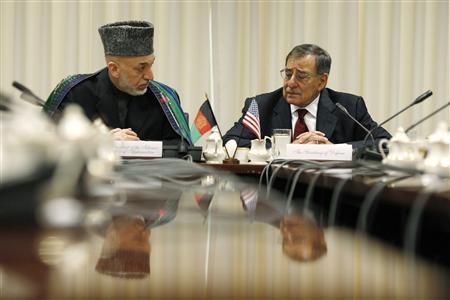 Hamid Karzai and U.S. Defense Secretary Leon Panetta discuss the “last chapter” in warU.S. Defense Secretary Leon Panetta and Afghan President Hamid Karzai discussed on Thursday the "last chapter" in building a sovereignAfghanistan that can provide its own security, including the nature of U.S. involvement after combat troops withdraw in 2014.
Hamid Karzai and U.S. Defense Secretary Leon Panetta discuss the “last chapter” in warU.S. Defense Secretary Leon Panetta and Afghan President Hamid Karzai discussed on Thursday the "last chapter" in building a sovereignAfghanistan that can provide its own security, including the nature of U.S. involvement after combat troops withdraw in 2014.
Panetta said he and Karzai made "very good progress" on the issues they discussed, but he declined to say whether they had agreed on the size of any residual U.S. force that would remain in Afghanistan to do counterterrorism operations and training once combat troops withdraw.
Panetta said both sides were committed to the goals approved at the NATO summit in Chicago in May, which calls for a continuing effort by members of the alliance to train, advise and assist Afghan forces. Karzai is scheduled to meet President Barack Obama on Friday for more talks on the remaining issues.
The Obama administration has been considering a residual force of between 3,000 and 9,000 troops in Afghanistan to conduct counterterrorism operations while providing training and assistance for Afghan forces. But the administration said this week it did not rule out a complete withdrawal after 2014.
While Karzai has been critical of U.S. troop activity in Afghanistan, it is unclear how Afghan forces would perform without U.S. helicopters, medical facilities, intelligence and other military support, of which Afghanistan has very little.
"After a long and difficult past, we finally are, I believe, at the last chapter of establishing ... a sovereign Afghanistan that can govern and secure itself for the future," Panetta told Karzai after a welcoming ceremony at the Pentagon that included an honor guard and 21-gun salute.
Panetta said 2013 would mark an important step in the war, with Afghans due to take over the lead role for security across the country.
"We've come a long way towards a shared goal of establishing a nation that you and we can be proud of, one that never again becomes a safe haven for terrorism," Panetta said. "Our partnership, forged ... through almost 11 years of shared sacrifice, is a key to our ability to achieve the final mission."
STRAINS IN RELATIONSHIP
Karzai's three-day visit to Washington follows a year of growing strains on the U.S.-Afghan partnership, including incidents in which Afghan soldiers or police attacked and killed U.S. or coalition troops. U.S. forces also were involved in a series of incidents that enraged Afghans, including burning Korans, which touched off days of rioting.
In addition to discussing the U.S. troop presence after 2014, the two countries are negotiating long-term support for the Afghan military. Afghan officials came with a list of military equipment, including aircraft, they hoped to obtain.
General Martin Dempsey, chairman of the Joint Chiefs of Staff, said he and Afghan Defense Minister Bismillah Khan Mohammadi discussed the equipment issue and agreed to start with a broader review of Afghanistan's threats and military needs.
"What we talked about yesterday was ... let's move beyond a wish list of equipment and start by discussing what is your vision for the future of the Afghan military against threats and requirements," Dempsey said.
"He was very open, very eager to enter into that kind of comprehensive strategic review, and from that will come ... a view of how to move from where they are today, which is clearly focused on counterinsurgency, to something they may wish to become in the future," he said.
Karzai, in remarks in Panetta's office, said he was confident that the two sides during his trip would "work out a modality for a bilateral security agreement" in the interests of both countries.
The United States is insisting on immunity for any U.S. troops that remain in Afghanistan. That question also may come up at Karzai's talks with Obama on Friday.
 В Атырау -10
В Атырау -10